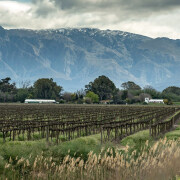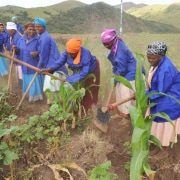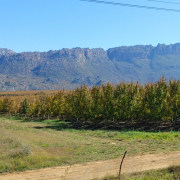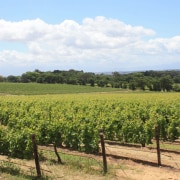|
Getting your Trinity Audio player ready...
|
Corruption Watch’s work in helping to expose and address corruption in the land sector is part of an international research project on how corruption affects the most marginalised of our communities in this regard. The project, overseen by Transparency International, has resulted in the recent release on 19 April 2024 of a report, This Beautiful Land: Corruption, Discrimination and Land Rights in Sub-Saharan Africa. It features research and case studies from seven countries in the region: Ghana, Madagascar, Kenya, South Africa, Uganda, Zambia, and Zimbabwe.
The research and report were conducted and completed through a partnership with the Equal Rights Trust.
On 23 April 2024 the two partners presented a webinar hosted by the Land Portal Foundation, where participants in the study – including Corruption Watch – shared their thoughts and insights on how corruption and discrimination intersect to erode land rights, and what strategies can be implemented to counter the situation.
Speakers included Sam Barnes, head of research at the Equal Rights Trust; Naome Kabanda, acting assistant commissioner of the Land Inspectorate Division in Uganda’s Department of Land Administration; Barbara Codispoti, the Global Land Programme lead at Oxfam Novib in The Hague; and Corruption Watch senior researcher Melusi Ncala.
“Disadvantaged and marginalised communities often bear the brunt of these unjust practices,” said moderator Sharon Kiburi, introducing the webinar and discussion panel. “Discrimination, whether based on disability, ethnicity, gender, or religion, denies these communities the right to access land.”
Tackling discriminatory corruption
Barnes explained that in 2021 the Equal Rights Trust published a report titled Defying Exclusion: Stories and Insights on the Links between Discrimination and Corruption. “That report was the first step in a long process to explore the phenomenon we term discriminatory corruption. It was an initial publication, it was exploratory research, and it recognised the need for further research in this area.”
This Beautiful Land, Barnes added, is the product of that further need for research.
“We examine the links between corruption and discrimination in the context of land governance in sub-Saharan Africa, and in a continent that’s been scarred by the legacies of conflict and colonisation, discrimination and corruption in this region cast wide shadows and their impacts are especially pronounced.”
Barnes went on to describe the structure of the report and the methodology, as well as discussion topics such as land tenure, the relevant international law, a global picture of discrimination and corruption issues in relation to land, and the particular issues in each of the countries under review, including case studies. He finished with a mention of the recommendations, which are grouped into eight categories: Recognition, Protection, Participation, Transparency and Accountability, Promotion, Sensitisation, Collaboration, and Research and Advocacy.
The way in which the report presents the nexus between corruption, discrimination, and land governance is absolutely relevant to the current global narrative on land, said Codispoti. She commended the authors on not confining themselves to a narrow vision of corruption and discrimination that is limited to a specific system or to specific groups or to individuals.
“I think that a risk of a narrow vision of corruption and discrimination as endogenous phenomenon is very dangerous. Sometimes we see this happening in international debates around corruption because it can divert the attention from global systemic causes and even more dangerously, it can contribute to justifying them.”
In this sense, Codispoti said, the report presents bold and interesting messages in the global context.
Righting the wrongs
Historically, land dispossession has been happening in South Africa for many centuries, said Ncala. “It was done not only on racial grounds, but also on primogeniture principles where only males had the divine right to own land, a western concept that was readily adopted in policy and law in South Africa.”
The South African government sought to redress these issues after 1994, he said, through various policies that were developed and introduced. “One of the policies that we looked at within this research relates to farm worker equity schemes … fundamentally based on the willing buyer/willing seller principle, which is simply to say that if we as the state can find white owners of land who are willing to sell the land to people who have claimed that piece of land, we will then assist those groups to purchase it.”
Corruption Watch’s case study focused on farm worker equity schemes in the Western Cape, and the research team found many irregularities and evidence of corruption and discrimination. “There was some nefarious activity by officials within the relevant department dealing with land issues, from inception. And farmworkers were discriminated against and experienced issues of accounting irregularities. They weren’t paid the dividends in most of the instances and those who were paid dividends received them infrequently.”
Other issues of human rights violations came to light, where people were housed in substandard homes or didn’t have access to medical facilities or health care, as well as children who were not given access to education.
From the Ugandan government perspective, said Kabanda, the report addresses two particular issues of interest: land acquisition and processes, and the entire land administration system.
Like South Africa, the land administration system was adopted from England and all laws emanated from there, she said, from colonial times to the present day. Unlike South Africa, which has tried to change the situation, Uganda has not been able to amend most of these laws.
“Government has decentralised the land services to a certain percentage, creating zone offices for example, and computerisation of the whole land administration process has enabled to break some of these institutional barriers.”
There are still hurdles, she added, such as the cost of land registration, which is very high and prevents poorer people from having their land surveyed.
The government is attempting to simplify those processes, said Kabanda. “We are doing a lot of pilots with the support of development partners to ensure that we reach the vulnerable people, including the women who are the majority users of land, and also who are the majority in our population.”
Linking land, corruption, and discrimination
For South Africa, it is vital to recognise that land and corruption are linked, said Ncala, before any further steps are taken to address the issue.
“We also have evidence that land corruption and discrimination are linked and it’s important to view these things as one because if we are to deal with land governance, or answering the land question as they say in South Africa, we need to always factor in the high possibility of corruption which then leads to discrimination. It helps us to factor in these aspects in formulation of laws as well as policies.”
But equally importantly, he said, there must be accountability.
“The South African government knows that farm worker equity schemes are a total mess. They’ve got evidence to this effect, they’ve done an investigation – but they don’t want to hold the officials accountable.”
Even worse, they don’t want to hold the farmers accountable.
“Law enforcement must criminally charge the corrupt parties and those who have violated people’s basic rights, so that we actually bring those who are perpetrators of corrupt activities to book.”








